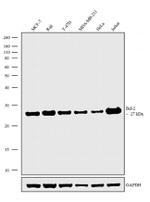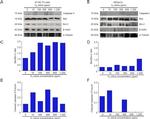Search Thermo Fisher Scientific
Invitrogen
Bcl-2 Monoclonal Antibody (Bcl-2/100), eBioscience™
This Antibody was verified by Knockdown to ensure that the antibody binds to the antigen stated.
FIGURE: 1 / 6
Bcl-2 Antibody (14-1028-82) in WB






Product Details
14-1028-82
Species Reactivity
Published species
Host/Isotype
Class
Type
Clone
Conjugate
Form
Concentration
Purification
Storage buffer
Contains
Storage conditions
Shipping conditions
RRID
Product Specific Information
Description: This bcl-2/100 monoclonal antibody reacts to human Bcl-2 (B-cell Lymphoma 2), the founding member of a family of pro-apoptotic proteins which includes Bcl-XL, Bcl-w, and Mcl-1. Bcl-2 plays a role in protecting against apoptosis-inducing insults such as dexamethasone and staurosporine, as well as irradiation and cytokine withdrawal. The mechanism is thought to include regulation of mitochondrial membrane permeability, resulting in sequestration of caspase proforms, or by preventing the release of apoptosis-mediating mitochondrial factors, such as cytochrome c and AIF (apoptosis-inducing factor), into the cytoplasm. Bcl-2 is localized to the cytoplasmic side of the mitochondrial membrane, the nuclear envelope, and the endoplasmic reticulum. Interestingly Bcl-2 does not play a role in preventing cell death of autoreactive T cells in the thymus or Fas-mediated apoptosis. Two isoforms, termed alpha and beta of Bcl-2 have been identified and are a result of alternative splicing at the C-terminus. This antibody recognizes both forms.
Applications Reported: This Bcl-2/100 antibody has been reported for use in immunoblotting (WB).
Applications Tested: This Bcl-2/100 antibody has been tested by immunoblot analysis of the Jurkat cell line. This can be used at 1-5 µg/mL for detection of reduced and denatured protein.
Purity: Greater than 90%, as determined by SDS-PAGE.
Aggregation: Less than 10%, as determined by HPLC.
Filtration: 0.2 µm post-manufacturing filtered.
Target Information
BCL-2 is a key regulator of apoptosis that functions to either inhibit or promote cell death. The BCL-2 family members are also characterized by dimerizing to further modulate apoptosis. Bag1, for example, has been found to form a heterodimer with BCL-2 resulting in the enhancement of the anti-apoptotic effect of BCL-2. Bax and Bak have been shown to play a critical role in cytochrome c release from mitochondria and thus initiate apoptosis. Bax exerts a pro-apoptotic rather than an anti-apoptotic effect on cells. Constitutive expression of BCL2, such as in the case of translocation of BCL2 to Ig heavy chain locus, is thought to be the cause of follicular lymphoma. In most follicular lymphomas, neoplastic germinal centers express high levels of BCL-2 alpha protein, whereas the normal or hyperplastic germinal centers are negative. Two transcript variants of BCL-2, produced by alternate splicing, differ in their C-terminal ends. The overexpression of BCL-2 has been linked to human cancers such as B-cell lymphoma and prostate cancer.
For Research Use Only. Not for use in diagnostic procedures. Not for resale without express authorization.
Bioinformatics
Protein Aliases: Apoptosis regulator Bcl-2; B-cell CLL/lymphoma 2; Bcl 2; OTTHUMP00000163680; protein phosphatase 1, regulatory subunit 50
Gene Aliases: Bcl-2; BCL2; PPP1R50
UniProt ID: (Human) P10415
Entrez Gene ID: (Human) 596

Performance Guarantee
If an Invitrogen™ antibody doesn't perform as described on our website or datasheet,we'll replace the product at no cost to you, or provide you with a credit for a future purchase.*
Learn more
We're here to help
Get expert recommendations for common problems or connect directly with an on staff expert for technical assistance related to applications, equipment and general product use.
Contact tech support
